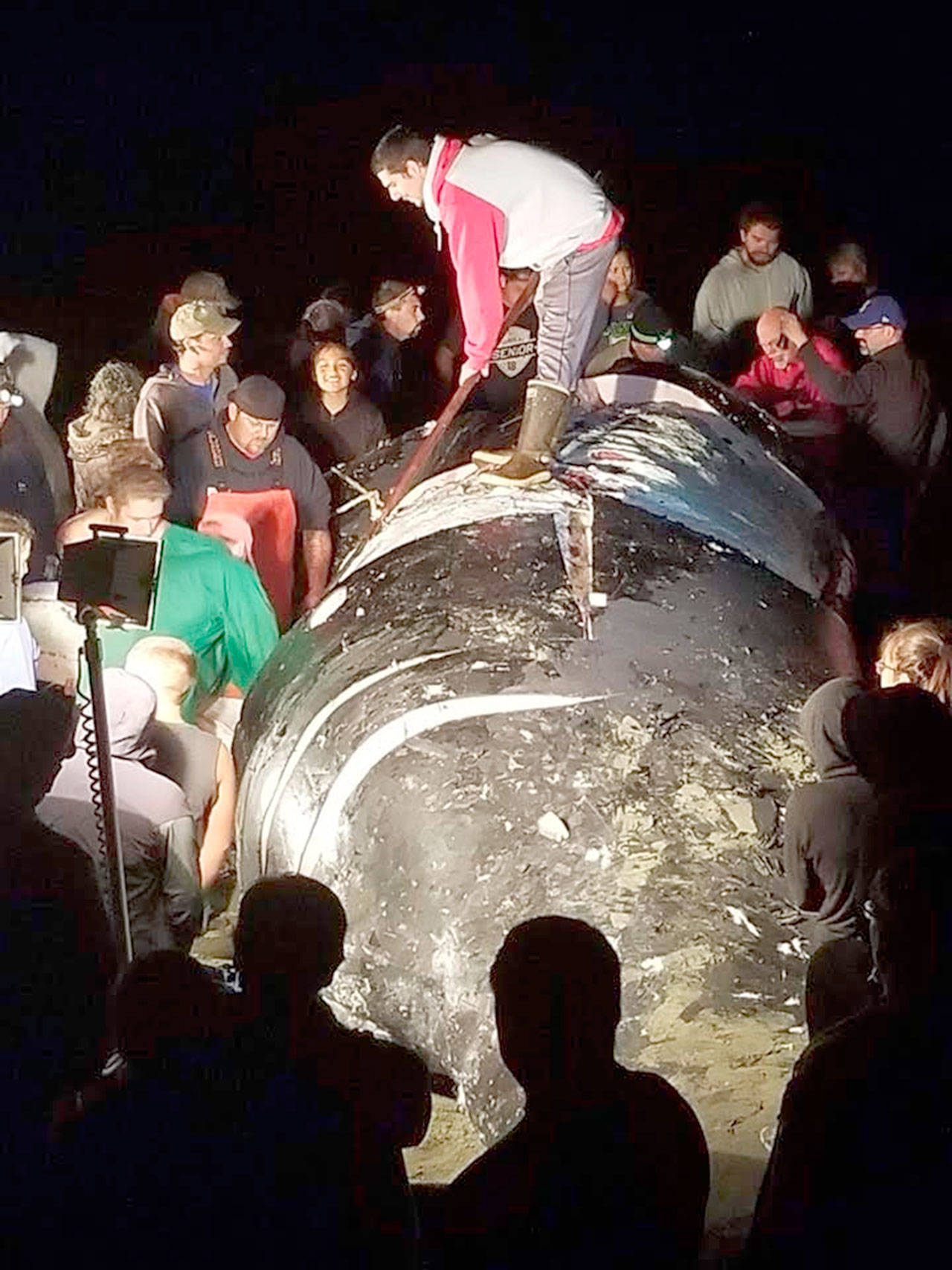NEAH BAY — A dead male humpback whale discovered floating Thursday morning near Sekiu was towed to Neah Bay and died from being struck by a ship, Makah tribal and federal officials said.
“It died instantly,” tribal marine biologist Jonathan Scordino said Friday.
It had not been injured or tangled in nets, Scordino said.
It was towed to the beach at Neah Bay’s town center Thursday night on the eve of Makah Days, tribal Chairman Nate Tyler said. Makah Days, a celebration of the Makah culture, began Friday and extends through today.
“We went through the standard protocol, working with the federal government,” Tyler said.
Tyler and Scordino said whale activity in the Strait of Juan de Fuca, which joins the Pacific Ocean at Neah Bay, has been unusually high.
“Over the last few weeks, krill has been very active in the Strait shipping lane, so it’s just increased the likelihood that something like this happens,” Scordino said.
Adult males are 40-48 feet in length, according to www. aquariumofpacific.org.
Michael Milstein, spokesman for the National Oceanic and Atmospheric Administration (NOAA), said a necropsy was conducted by Scordino and Cascadia Research Collective marine mammal biologist Jessie Huggins.
The 31-foot-long juvenile’s skull was fractured and its lower left jaw broken.
Milstein said the animal was healthy before being struck by a ship.
Pulled from Sekiu to Neah Bay by a Makah fishing vessel and four other boats, the tiny flotilla was greeted by about 300 tribal members, Tyler said.
The ceremony celebrated the tribe’s heritage of whaling and of using the animals for sustenance, a tradition that dates back at least 1,500 years.
“We conducted business in a sacred way, and it was pretty emotional for everyone that was down there and was able to witness it,” Tyler said.
“It was something that we all will hold close to our heart and always remember.”
“Last night was a pretty historic moment for the Makah Tribe.”
The animal, discovered in the tribe’s “usual and accustomed” fishing grounds, will be butchered and made available to tribal members after a full examination is completed, Tyler said.
“It will be set aside for Makah Tribal members’ consumption.
“All tribal members are free to have as much access to whale meat as they please.
“It’s going to be stored in cold storage in Neah Bay, and our intent is to fully utilize what’s been offered.
“It’s a pretty big deal, Tyker added.
“We’ve been, I’m getting emotional here, we’ve been patient working with the federal government through the 9th Circuit Court of Appeals in the environmental assessment.
“It’s been almost 20 years since our initial whale hunt.
“Our people have been pretty patient and waiting for a day like this to come and take full advantage of what’s been offered.”
It was the third whale the tribe has used for subsistence purposes since 1999, when a whale was killed under the 1855 Treaty of Neah Bay for the first time since the 1920s.
A whale was stranded on an Olympic National Park beach in June 2001 that also was used for subsistence by the tribe.
Milstein said the dead whale was reported to NOAA by the Makah Tribe.
NOAA asked Cascadia Research Collective to respond in conjunction with the West Coast Marine Mammal Stranding Network, which includes the Makah Tribe.
Tissue and skin samples were collected to discern the presence of disease and conduct genetic tests and “to understand how the whale fits into the whale population,” Milstein said.
“Since all the scientific needs are met, the tribe is looking to use it for subsistence purposes.”
Milstein said NOAA is finishing an analysis of a 2015 draft environmental impact statement that could result in the federal government proposing to grant the Makah a waiver from the Marine Mammal Protection Act that could lead to a resumption of whaling by the Makah.
An administrative law judge will make a recommendation to Chris Oliver, the head of NOAA fisheries, on allowing a waiver.
“We haven’t decided yet to proceed with that waiver proposal,” Milstein said.
“Court litigation determined the process we have to follow, and we are pursuing that.”
Options in the EIS include allowing the tribe to proceed with hunt but do not recommend a preferred alternative among four offered.
Milstein said the analysis could be completed by December.
“We are nearing the end of the process,” he said.
Twenty years ago in May, the tribe successfully hunted its first whale in more than 70 years, sparking protests, court action and nationwide news coverage that focused on tiny Neah Bay, an unincorporated town of about 800 people.
Vehicle lined Neah Bay’s main road for about a mile to mark the arrival Thursday night of the humpback.
“We conducted business in the Makah way,” Tyler said Friday.
“It was a sacred ceremony.”
He’d been thinking about something else, too, since Thursday, he said Friday.
“We feel bad,” Tyler said.
“We definitely regret that the whale died, but in return, our culture and traditions live on through this whale’s passing.”
________
Senior Staff Writer Paul Gottlieb can be reached at 360-452-2345, ext. 55650, or at pgottlieb@peninsuladailynews.com.

